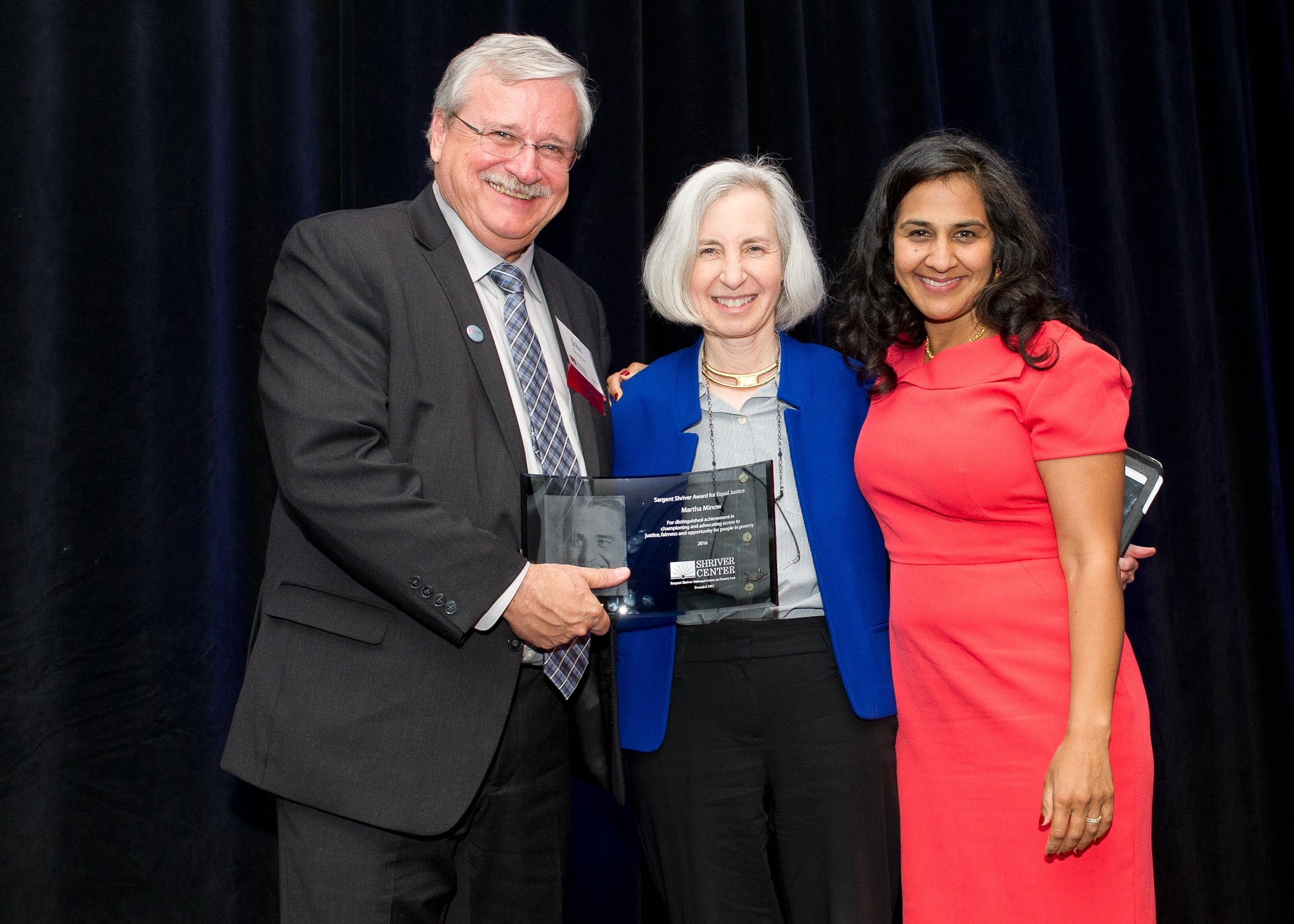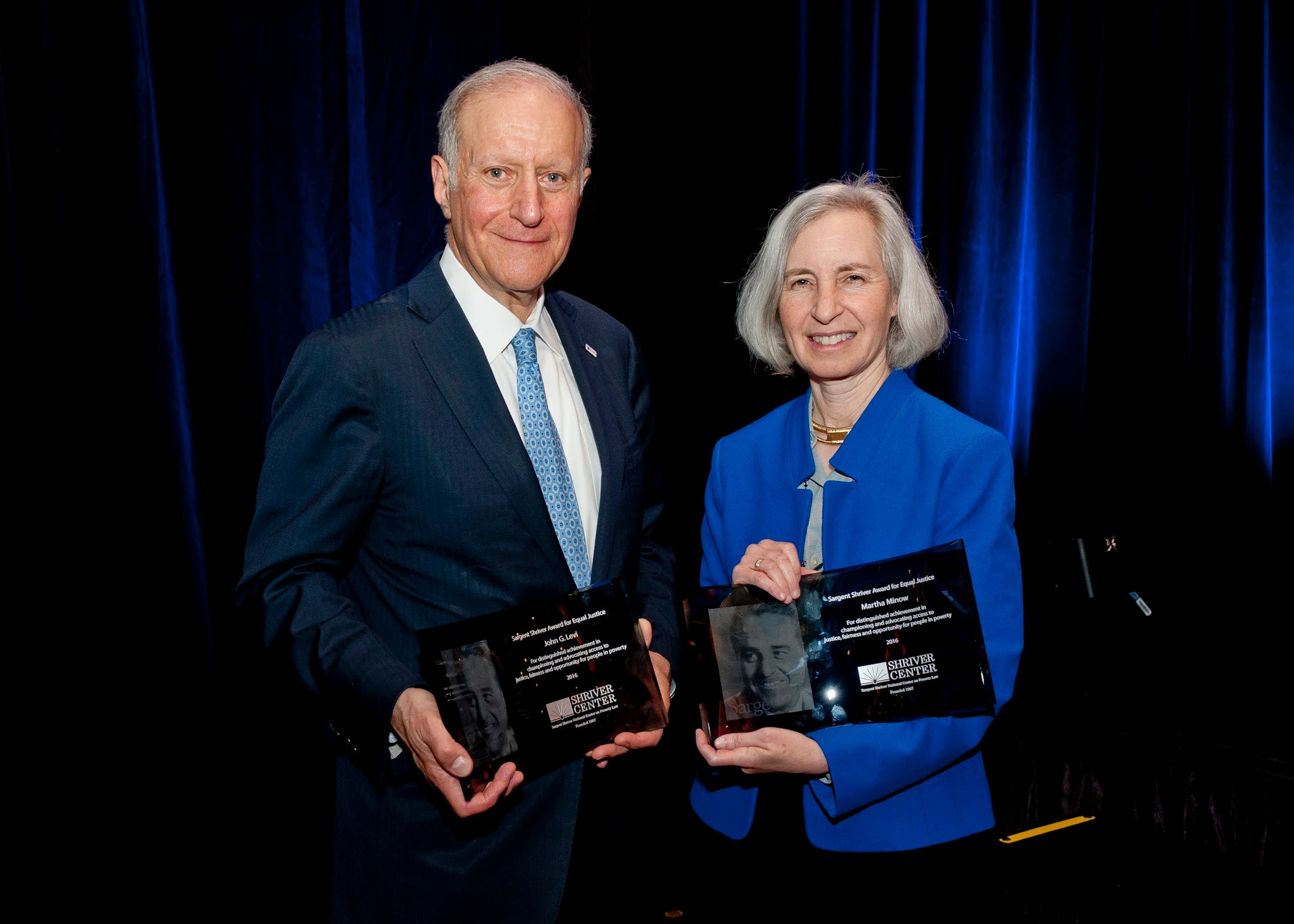Harvard Law School Dean Martha Minow was honored by the Sargent Shriver Center on Poverty Law with the Sargent Shriver Equal Justice Award at their annual benefit in Chicago, on June 14. She and John Levi ’72 LL.M. ’73, who serve as vice chair and chair of the board of directors of the Legal Services Corporation, were recognized for their significant contributions to the movement for equal justice for low-income individuals.
In her remarks, Minow thanked the center and “all who provide legal services, advocacy, and policy work,” and “the clients who summon the courage to seek help and claim rights.” She went on to say that she “salutes all who work to make access more than getting near to justice–who make it possible for people to enact and receive justice.” Read her full remarks here.
Venu Gupta ’99, vice president of development for the Shriver Center and a former student of Dean Minow’s, presented the award. Gupta described Minow as a “superhero for justice,” and said: “Martha, like all superheroes, has special powers: She has the power of a mind-blowing intellect; she has the power of a belief that anyone suffering injustice anywhere in world deserves a voice; and, of course, Martha has the power of an all encompassing love.”
The Legal Services Corporation is the single largest funder of civil legal aid for low-income Americans in the U.S. It was established in 1974 and operates as an independent nonprofit corporation that promotes equal access to justice and provides grants for civil legal assistance to low-income Americans.
The 11-member bipartisan Legal Services Corporation Board is appointed by the President and confirmed by the U.S. Senate, and the members come from every region of the country. Minow and Levi were nominated by President Barack Obama ’91 to serve on the board in August 2009. Levi was elected chair of the LSC Board and Minow was elected vice chair of the LSC Board by fellow board members in April 2010.
During their tenure, Levi established a fiscal oversight task force, establishing rigorous fiscal practices to govern the LSC oversight of 134 grantee organizations providing direct legal services around the country, and a pro bono task force, which Minow co-chaired. The pro bono task force’s recommendations included asking Congress for a pro bono innovation fund, which Congress authorized, and a pro bono toolkit, using digital tools to share best practices developed by law firms, bar associations, and law schools. Through technology innovation grants, LSC supports new digital tools to increase access to justice for veterans, survivors of domestic violence, and others in need.

In his remarks, Levi outlined the crisis in civil legal assistance. He said: “Last year, more than 61 million Americans qualified for civil legal aid during the entire year, and 30 million more qualified because they lived for two months or more at or below 125% of the federal poverty guideline — nearly thirty percent of our population. But, unfortunately, LSC funding from our Congress continues at a near all-time low in inflation adjusted dollars — in actual dollars $385 million, which is still below the $400 million actually appropriated in the mid 90’s, and less than half of what in today’s dollars would be the $880 million appropriated just two years after LSC’s founding in the 1970s, when only 12 percent of our population qualified for LSC-funded assistance. To put this into perspective, the current appropriation to LSC for basic field grants to legal aid – the amount that can be used to fund the day-to-day operations of legal aid programs – is about equal to what Americans spend every year on Halloween costumes. For their pets.” Read his full remarks here.
Levi was introduced by David Hoffman, a former Inspector General and current partner at Sidley. Hoffman has served on the LSC Fiscal Oversight Task Force and as a member of LSC’s Audit Committee.
An expert in human rights with a focus on members of racial and religious minorities and women, children, and persons with disabilities, Minow has published more than 150 articles and her scholarship has addressed private military contractors, management of mass torts, transitional justice, and law, culture, and social change. Her books include: “The First Global Prosecutor: Promise and Constraints” (2015) co-edited with Cora True-Frost and Alex Whiting; “In Brown’s Wake: Legacies of America’s Educational Landmark” (2010); “Partners, Not Rivals, Privatization and the Public Good” (2002); and “Between Vengeance and Forgiveness: Facing History After Genocide and Mass Violence” (1998).
Her awards include the Sacks-Freund Teaching Award; the Holocaust Center Award; the Radcliffe Graduate Society Medal; Trinity College History Society Gold Medal; and eight honorary doctorates. She was elected a fellow of the American Academy of Arts and Sciences in 1992.
Levi is a long-time partner in Sidley’s Chicago office in the employment and labor law group. He is the immediate past chair of Sidley’s Law School Recruiting Committee and currently co-leads the firm’s committee overseeing the firm’s adoption of the Kanoon Magnet School, Chicago Public School. He’s a member of American Academy of Arts and Sciences and he was the first recipient of the Abner and Zoe Mikva Corporate Citizenship award given by Mikva Challenge in 2011.
In 2010, Levi received the Harvard Law School Society of Illinois’ Role Model Award, and, in 2015, he received the Harvard Law School Society of Illinois’ highest honor, the Jerold S. Solovy Award “in recognition of commitment to public service and the highest ideals of the profession.”
The Sargent Shriver Center on Poverty Law is a national leader in advancing laws and policies that secure justice to improve the lives and opportunities of people living in poverty. Their Advocacy Program works collaboratively with community organizations, service providers, legislators and others to pursue justice for low-income clients. The Advocate Resources and Training Program trains and connects equal justice providers nationwide to strengthen the ability of these advocates and their organizations to help drive systems change.
